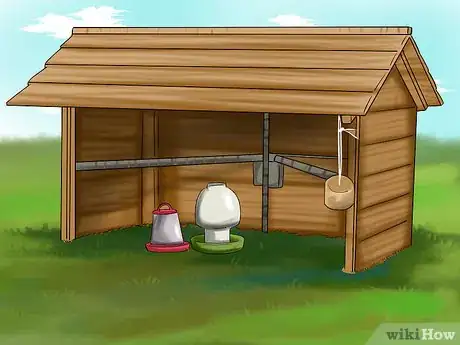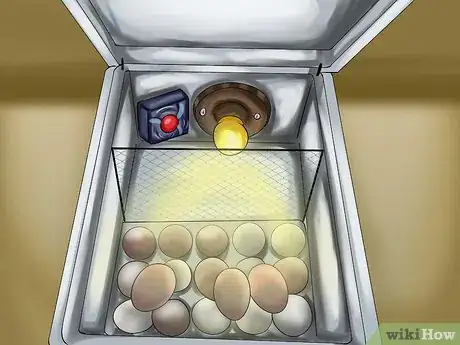This article was co-authored by Ryan Corrigan, LVT, VTS-EVN. Ryan Corrigan is a Licensed Veterinary Technician in California. She received her Bachelor of Science in Veterinary Technology from Purdue University in 2010. She is also a Member of the Academy of Equine Veterinary Nursing Technicians since 2011.
There are 8 references cited in this article, which can be found at the bottom of the page.
This article has been viewed 44,087 times.
If it's legal in your area, raising chickens in your backyard can be a fun hobby, and you might get fresh eggs out of the project! Keep reading to learn how to keep your chickens safe, comfortable, and healthy.
Steps
Setting Up the Habitat
-
1Buy a premade chicken coop for an easy option. Buying your coop is often the easiest way to set up your chicken habitat. Premade coops can be bought online for a couple hundred dollars and shipped to your home. Not only does it save you the hassle of trying to build one yourself, buying a premade coop also ensures that your habitat will be safe and structurally sound.
- These coops usually house anywhere from 2 - 5 chickens.
- You may also be able to find them at local feed stores.
-
2See if you can make use of an existing structure. To save money and space, see if there is an existing structure in your yard that can be converted into a chicken shelter. It costs a good deal of money to hire people to build a shelter, so converting space can help with this.[1]
- Something like a small playhouse, staircase, or the space beneath a deck may work.
Advertisement -
3Select the right materials. To build a chicken house, you need proper supplies. For the floor, you should opt for knotty cedar. The rest of the house can safely be built from pine.[2]
- If you've never built a structure before, or never built one for animals, hiring professional help is highly recommended. You can find blueprints for chicken structures online and follow them, but they can be complicated if you're unfamiliar with building. A flimsy or poorly built structure can be dangerous for your chickens.[3]
-
4Keep the floor elevated off the ground. The floor of a chicken coop will rot if it's on bare ground. You should make sure to elevate the floor 2.5 (approximately .7 meter) off the ground. You will have to provide some kind of foundation, such as cinderblocks, to do so.[4]
-
5Line the floors of the coop with bedding. Bedding is an important part of your coop because it provides comfort and stability for your chickens, gives eggs a soft place to land, and soaks up excrement for easy cleanup. The best bedding options to consider include:[5]
- Straw or hay
- Pine shavings
- Sand
-
6Include the necessary features. Certain features are key to keeping your chickens warm and safe. Make sure to include the following:[6]
- You will need grates on the top of the house. This helps with air circulation.
- The house should have a hen-sized door on one side and a human-sized one on the other.
- The coop should be properly insulated during the cooler months. Placing your coop against your heated garage can help with this. Alternatively, you could invest in heating units that are safe for chicken coops. These can be hung from the ceiling or side of the coop. Make sure that your heating unit is not too close to the birds, as they could get burned.
-
7Keep chickens safe from predators. It's vital that you provide locks to secure your chickens at night. During the night, your chickens should be in the coop with the doors locked. Chicken wire or hardware cloth should surround the perimeter of your chicken coop.[7]
- You should also have chicken wire or cloth on top of the chicken coop to protect against predators like owls.
- Free range chickens still need a shelter or covering to protect them from predators, especially at night.
-
8Check local laws and regulations. You want to make sure you follow any rules regarding raising chickens in your area. In some areas, for example, you may be required to keep your chicken coop a certain distance from your home or your neighbors' homes.
-
9Clean your coop regularly. You should clean your coop regularly to keep your chickens healthy and happy. Regularly scoop out the coop, removing stray feathers and droppings. Then, hose down the walls. Do one more round of shoveling to get anything your missed. Using equal parts water and white vinegar, scrub down the chicken coop with a brush. Rinse it again and allow it to air dry before letting chickens back into the coop.[8]
- Keeping feed off of the floor will help prevent vermin and predators from invading the coop. These critters could bring diseases or could kill your chickens.
Feeding and Caring for Your Chickens
-
1Use a commercial chicken feed. The staple of your chicken's diet should be a healthy commercial chicken feed. You can buy chicken feed at a local livestock store or purchase it online.[9]
- You should distribute food using a chicken feeder. You should check the feeder every other day and remove moldy or wet food.
- How much food your chickens need depends on the number of chickens. Feeding guidelines should be provided on the package.
-
2Supplement your chickens' diet with table foods. Chickens are healthiest when raised with a variety of types of food. In addition to chicken feed, supplement their diet with table scraps. Produce like watermelon, apples, bread, and scraps of meat like bacon can be tossed into a chicken coop instead of thrown out.[10]
- Chickens actually do enjoy eggs and eggshells as well. Do not hesitate to toss egg shells into your chicken's coop instead of discarding them.
-
3Provide clean water at all times. It's important that your chickens stay hydrated. You should keep a large water bowl in their coop and make sure it's full at all times. A 5-gallon bucket is a good option. Check it each time you check your chickens. Fill it up as needed and replace the water if it gets dirty.[11]
- Go for a heated bowl or bucket in the winter to keep water from freezing.
-
4Manage egg production. Keep a light bulb on in the coop as this encourages egg production. You can remove eggs when you see them and use them as food. You can expect each hen to lay about six eggs per week.[12]
- If you have a rooster in your coop, do not collect eggs. They may be fertilized.
Avoiding Common Mistakes
-
1Check the laws in your area. Before committing to raising chickens, check the laws. Look into your city, state, or local homeowner's organization. You should also check with the local Department of Natural Resources. In some areas, it may not be legal to keep chickens in the backyard.[13]
-
2Take precautions to avoid salmonella. Chickens can spread salmonella. To keep yourself safe from the virus, you should take some safety precautions. Do the following to protect yourself from salmonella:
- Wash your hands after handling your chickens or anything in or near the chicken shed.
- Minimize contact with your birds. Do not pet, snuggle, or kiss the chickens and discourage children from doing the same. Do not let chickens in your home.
- Do not eat or drink near the chickens.
-
3Make sure to account for cost. It is not expensive to raise chickens. The upfront cost of building a home, especially if you hire help, can run between $300 and $400. There will also be monthly expenses, such as food, water, and heating systems. Make sure you can afford chickens before committing to raising them.[14]
-
4Be prepared to take care of chicks. Even if you're careful to select only hens; roosters sometimes slip in by accident. Just in case chickens lay fertile eggs, have a brooder set up. You can use a large cardboard box filled with pine shavings. You should also install a heat lamp to keep chicks warm. Any potentially fertile eggs should be transferred to a brooder.[15]
- Make sure to keep your brooder away from predators, especially cats and dogs. It may be safest to store the brooder in an enclosed space, such as your garage.
Warnings
- Test your soil for lead before getting chickens, as levels of lead over 117mg/kg in soil have been shown to go through the chickens to create eggs with unsafe levels of lead.[16]⧼thumbs_response⧽
References
- ↑ http://www.rodalesorganiclife.com/home/how-to-raise-chickens-in-a-tiny-yard
- ↑ http://www.rodalesorganiclife.com/home/how-to-raise-chickens-in-a-tiny-yard
- ↑ http://www.rodalesorganiclife.com/home/how-to-raise-chickens-in-a-tiny-yard
- ↑ http://www.rodalesorganiclife.com/home/how-to-raise-chickens-in-a-tiny-yard
- ↑ http://www.hobbyfarms.com/7-coop-bedding-materials-and-how-to-choose-the-right-one-3/
- ↑ http://www.rodalesorganiclife.com/home/how-to-raise-chickens-in-a-tiny-yard
- ↑ http://www.rodalesorganiclife.com/home/how-to-raise-chickens-in-a-tiny-yard
- ↑ http://www.theprairiehomestead.com/2011/03/naturally-disinfecting-the-chicken-coop.html
- ↑ http://www.artofmanliness.com/2013/03/26/how-to-raise-backyard-chickens/
- ↑ http://www.artofmanliness.com/2013/03/26/how-to-raise-backyard-chickens/
- ↑ http://www.artofmanliness.com/2013/03/26/how-to-raise-backyard-chickens/
- ↑ http://www.extension.umn.edu/food/small-farms/livestock/poultry/backyard-chicken-basics/
- ↑ http://wholefully.com/2016/05/19/how-to-start-raising-backyard-chickens-in-7-simple-steps/
- ↑ http://www.almanac.com/blog/home-health/chickens/raising-chickens-101-how-get-started
- ↑ http://wholefully.com/2016/05/19/how-to-start-raising-backyard-chickens-in-7-simple-steps/
- ↑ https://theconversation.com/backyard-hens-eggs-contain-40-times-more-lead-on-average-than-shop-eggs-research-finds-187442
About This Article
To keep chickens in a backyard, you’ll need to either buy a premade chicken coop or make one yourself. Once you have the coop in place, line its floor with a bedding material, like straw, hay, or pine shavings to make cleaning up easier. You should also set up a chicken wire or hardware cloth fence around the perimeter for security. When you put your chickens in their coop, make sure you lock them in overnight to protect them from predators.To keep your chickens healthy, give them table scraps, like apples, bread, and bacon, in addition to a commercial chicken feed. If you want to increase egg production, keep a light bulb on in the coop, which encourages them to lay eggs in the dark. For more tips from our Veterinary co-author, including how to build your own chicken coop, read on!











































































